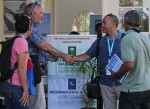Small island developing States (SIDS) and development partners continued their general debate at the Third International Conference on SIDS on 2 September, in Apia, Samoa, addressing issues of debt restructuring, SIDS' resilience, waste management, climate change, sea-level rise and recovery from extreme weather events.
Several SIDS speakers stressed that access to financing and operationalization of the Green Climate Fund (GCF) require the attention of the international community, in the quest for sustainable development.
 2 September 2014: Small island developing States (SIDS) and development partners continued their general debate at the Third International Conference on SIDS on 2 September, in Apia, Samoa, addressing issues of debt restructuring, SIDS’ resilience, waste management, climate change, sea-level rise and recovery from extreme weather events. Several SIDS speakers stressed that access to financing and operationalization of the Green Climate Fund (GCF) require the attention of the international community, in the quest for sustainable development.
2 September 2014: Small island developing States (SIDS) and development partners continued their general debate at the Third International Conference on SIDS on 2 September, in Apia, Samoa, addressing issues of debt restructuring, SIDS’ resilience, waste management, climate change, sea-level rise and recovery from extreme weather events. Several SIDS speakers stressed that access to financing and operationalization of the Green Climate Fund (GCF) require the attention of the international community, in the quest for sustainable development.
Country statements also highlighted: fisheries; sustainable economic development; graduation from Least Developed Country (LDC) status; gender equality and the creation of decent jobs. Many urged that partnerships be durable, innovative and based on the principle of common but differentiated responsibilities (CBDR). Delegates said partnerships must move beyond traditional models of partnership and include academia, civil society and the private sector. Partnerships also highlighted examples of model partnerships and cooperation, including: the SIDS DOCK sustainable energy mechanism; the Caribbean Biological Corridor; and the International Renewable Energy Agency (IRENA) ‘SIDS Lighthouses’ initiative for scaling up renewable energy in SIDS.
In parallel with the plenary discussions, two multi-stakeholder partnership dialogues took place. During the dialogue on climate change and disaster risk management (DRM), in the morning, many countries and organizations mentioned existing or new partnerships for responding to climate change and promoting resilience, including through: early warning systems; weather services; risk assessment and management for adaptation to climate change in the natural resource-based sectors of agriculture, fisheries, forestry and tourism; developing renewable energy sources; and building capacity of local governments. Anote Tong, President, Kiribati, announced the creation of the Coalition of Atoll Nations on Climate Change, made up of low-lying countries already suffering from climate change impacts. Several other countries made announcements, including on commitments to: mobilize funds for the Kyoto Protocol Adaptation Fund; fast-start finance and the GCF; establish Caribbean and Pacific Investment Facilities; provide weather-monitoring equipment to SIDS; and construct a new Pacific Climate Change Center.
The dialogue on social development, health and non-communicable diseases (NCDs), youth and women took place in the afternoon. Delivering a keynote address, Helen Clark, UN Development Programme (UNDP) Administrator, noted: challenges posed by NCDs due to diabetes and obesity in SIDS; high youth unemployment rates; migration due to lack of opportunities; and gender inequality issues related to low participation rates of women in decision making, limited access to decent work and family violence. Leao Talalelei Tuitama, Minister of Health, Samoa, mentioned the Apia Challenge partnership, which highlights opportunities where SIDS can jointly strengthen NCD policies. Palau, for the Pacific Island Forum, officially launched the Pacific NCD Partnership for a Multi-sector Approach to Prevent and Control NCDs (Pacific NCD Partnership).
Many side events took place throughout the day and into the evening, including high-level events on: ‘Ridge to Reef’ approaches to island ecosystem management and governance that link watersheds to coastal habitats and contribute to poverty reduction, sustainable livelihoods and climate resilience; and SIDS’s Pathways to Inclusive Green Economy and Poverty Reduction. [IISD RS Meeting Coverage] [UN Press Release]